Iranian Sunni Prisoner Executed Amid Human Rights Concerns
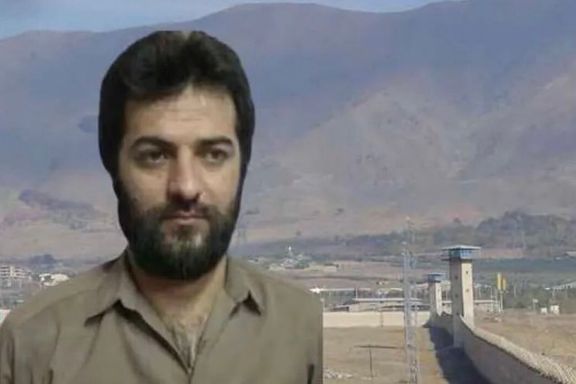
Qasem Abasteh, an Iranian Sunni prisoner, was executed in a prison near Tehran during the early hours of Monday.

Qasem Abasteh, an Iranian Sunni prisoner, was executed in a prison near Tehran during the early hours of Monday.
The 44-year-old was transferred to the special unit within the prison to carry out the execution order last week.
Following Abasteh’s transfer to solitary confinement, a group of political prisoners detained at Ghezel Hesar prison issued a public call to prevent his execution.
In their letter, they emphasized the absence of a fair trial, stating, "We cannot allow the current circumstances and the escalating regional tensions to provide an opportunity for the execution of a fellow countryman and a government-sponsored killing."
Ahmadreza Haeri, a political prisoner, wrote from prison, "The entire trial did not last more than two minutes. Judge Moghiseh said first, you are a Kurd! Second, you are Sunni! Third, you have Salafi beliefs! These are the three reasons for the execution."
Abasteh, a father of two from Mahabad, was detained in December 2009, along with six other Kurdish citizens, by security forces, amid ongoing oppression of Kurdish Iranians.
In 2015, the Sunni inmates were tried by Judge Mohammad Moghiseh, the head of Branch 28 of the Tehran Revolutionary Court and sentenced to death. The sentences were confirmed by the Supreme Court in 2020, after years of legal wrangling. In September 2020, their request for a retrial was rejected by the Supreme Court.
They were accused of various charges, including "War against God," "corruption on earth," "support for Salafi groups," and the "murder" of Abdolrahim Tina, who was killed by unidentified assailants in September 2008. However, in their numerous letters published by human rights organizations in recent years, the individuals denied any connection to the allegations.
With Abasteh’s execution, six other prisoners who were co-defendants with him are now at risk of execution.
In October alone, 78 prisoners were executed in Iran and in the first half of 2023, 354 were executed.
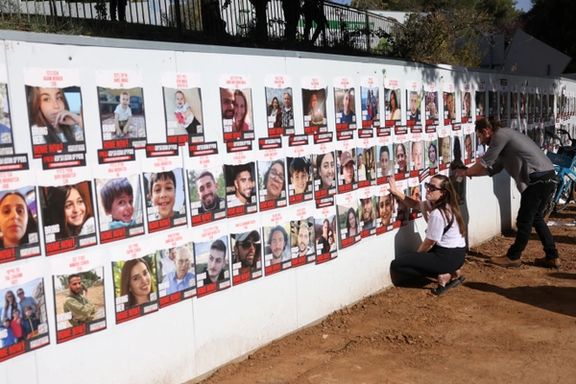
Iran denies involvement in the Hamas massacre of October 7, but a new report says the Islamist group postponed the attack upon coordination with Tehran.
Israeli journalist Ben Caspit said Sunday that Hamas's mass infiltration and onslaught leaving 1,400 mostly civilians dead and 241 hostages taken into Gaza, was originally intended to take place during last Passover's Seder meal Jewish holiday in April, which happened to coincide with Quds Day – an annual anti-Israel event initiated by the founder of the Islamic Republic, Rouhollah Khomeini.
According to the report, the Islamic Republic decided to delay the organized assault on civilians to Simchat Torah due to reasons that are unclear. However, Caspit speculated, it could have been postponed due to Tehran’s informal behind-the-scenes talks with the United States, which culminated in the release of Iran's oil revenues frozen in South Korea under US sanctions.
About $6 billion was freed up for Iran mid-September after Iran released five Iranian-Americans held in Tehran in exchange for five Iranians imprisoned in the US. Hamas declared war on Israel less than a month later. Iran openly supports Hamas and supplies military technology, training and logistics for its so-called ‘resistance’ against Israel and even held celebrations for the attack but insists it had no role in it.

The extent of the regime’s involvement in the Hamas attack, if and when it is established, would likely inform the nature of the response from Israel and the United States. Many in Washington are already pushing for retaliatory measures, including re-freezing the $6 billion. US Senators have written to President Biden, demanding that access to the money (currently held in a Qatari bank) be denied.
Hamas’ attack on Israel has enraged US officials who had warned the Biden administration of the consequences of its lenient approach to the regime in Iran. “Make no mistake— Hamas's genocidal violence was partly enabled by Biden unfreezing billions of dollars to Iran,” Senator Ted Cruz said Tuesday.
Last year in an interview with Al Jazeera, Hamas chief Ismail Haniyeh publicly thanked Tehran for supporting it with $70 million to help it develop missiles and defense systems, saying the regime is the terror group’s biggest donor. Gabriel Noronha, a former special advisor for the Iran Action Group at the US Department of State, said last month, Iran was giving Hamas $100 million a year in 2017 and with the Trump administration's maximum pressure policy on Iran, the Islamist group had to adopt austerity measures, but today “Hamas is getting $350 million from Iran that is 93 percent of its budget.”
The information was uncovered during the interrogation of Hamas militants who participated in the October 7 massacre, codenamed operation al-Aqsa flood (storm in Persian). The US considers Iran "at least complicit” in the attack, the State Department said last month but insisted it had no evidence of Tehran's direct involvement. Caspit noted that the information "might not have reached decision-makers or passed a validity test. But it did reach the ears of interrogators.”
Elsewhere in his reports, Caspit said that the October 7 date was chosen partly due to its proximity to the 50th anniversary of the Yom Kippur War, a three-week armed conflict fought in October 1973 between Israel and a coalition of Arab states led by Egypt and Syria.
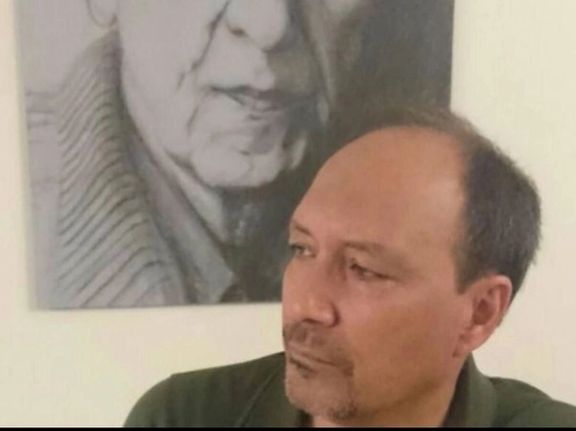
In the relentless campaign against Iranian activists, the case of Masoud Zeinalzadeh, a teacher arrested during Armita Geravand's funeral, has been referred to the Revolutionary Court.
Security forces, during Armita Geravand's funeral, violently stormed the attendees, subjecting some to physical abuse.
They arrested Masoud Zeinalzadeh, a vocally anti-regime teacher, along with several other citizens during the ceremony, Human Rights In Iran reported.
The burial and memorial service for Armita Geravand, who died due to the actions of hijab enforcement authorities, took place in Tehran last Sunday.
In another case of mounting pressure on teachers, Ahmad Alizadeh, a protesting teacher in Abdanan in the southwest, who was sentenced to six years in prison, has been relocated to Ilam prison.
The cultural activist had been detained during the Woman, Life, Freedom protests.
According to a report by the Hengaw Human Rights Organization, Ahmad Alizadeh, 50, was summoned and appeared at the revolutionary court of Abdanan, where he was arrested and transferred to prison.
He was previously sentenced for charges including "propaganda against the Islamic Republic of Iran" and "disturbing public opinion" to 27 months of imprisonment.
Alizadeh was also sentenced to additional penalties, including two years of suspension from work, two years of exile, and one year of prohibition from online activities.
Iranian teachers have been demanding higher wages and pensions for years, as one of the lowest paid classes of government employees. They also protested against the poisoning of schoolgirls which began in Iran last November, affecting numerous educational institutions and thousands of students.
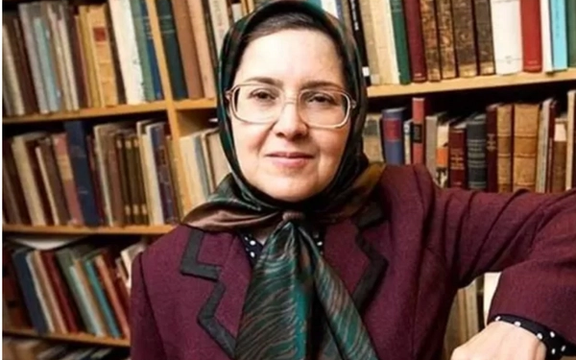
New details have emerged of the physical assault on mourners attending the funeral of 16-year-old Armita Geravand, who died after a confrontation with hijab enforcers.
Sedigheh Vasmaghi, a writer and Islam researcher, known for her stance against mandatory hijab, shared her experience after her arrest at the funeral on the Zeytoon website.
She said: "Two women were also among the attackers, dressed in uniform under their veils. The four assailants began their assault. One was shouting, one was trying to take my bag, and one was hitting me while uttering indecent language."
Referring to the death of Armita, a girl who, like Mahsa Amini, died in the hands of morality police, Vasmaghi added: "I asked them, 'You have taken one life, and her memorial is here. Do you intend to take mine here as well?' They forcibly dragged me for about ten to fifteen meters."
The burial and memorial service for Armita took place in Tehran last Sunday, with several more attendees arrested. Among them was also Nasrin Sotoudeh, a prominent human rights lawyer and activist, detainees all reportedly subjected to physical abuse during their apprehension.
On the day of the funeral, reports received by Iran International indicated that Vasmaghi was attacked by security officers after departing the ceremony. However, with the assistance of concerned citizens, she managed to escape the clutches of four male and female attackers.
Despite a week having passed since the assault by security forces, the status of some detainees remains unknown. Negar Ostad Agha, a journalist and senior editor at Etemad Online is currently detained in Gharchak Prison near Tehran, with no specific information available regarding her situation.
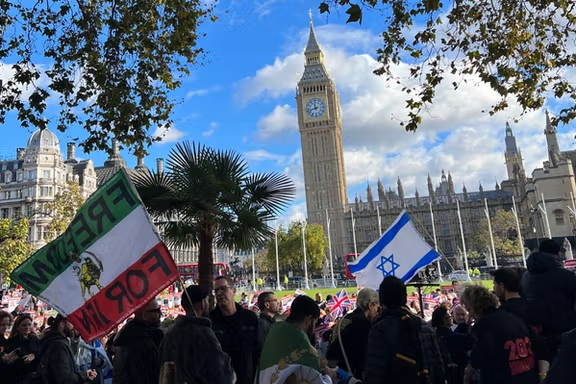
Amid a wave of pro-Palestinian rallies across the world, hardliners in Iran are admitting that the general public there have little appetite for the Palestinian cause.
Iran has seen no grassroot, popular expression of solidarity with Palestinians, except by groups supported by and loyal to the regime, since Israel began its onslaught on Gaza in retaliation for Hamas’ attack of October 7.
This is despite the fact that the Islamic Republic of Iran is the main supporter of Hamas –or perhaps because of it.
Nasser Imani, a conservative journalist and a staunch supporter of Supreme Leader Ali Khamenei, acknowledged in an interview Sunday that many ordinary Iranians “stand against whatever the Islamic Republic favors, and support whatever the Islamic Republic opposes.”
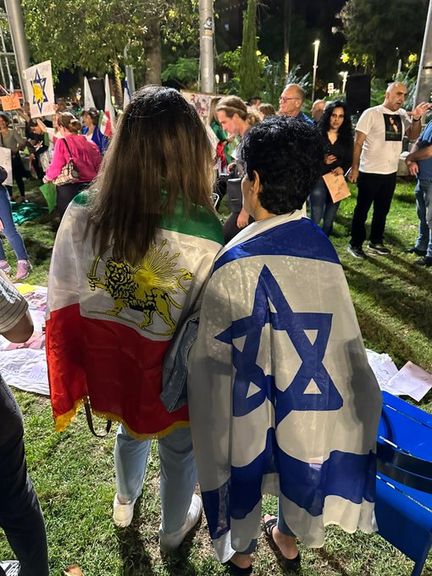
“Of course, when you have the overseas TV channels in your home all day, airing news that is biased in favor of the US and Israel, you can’t expect anything but this,” Imani said. He was referring to Persian-language broadcasters based abroad, such as Iran International, Manoto TV based in London, the Voice of America and BBC in Persian.
The Iranian regime has been on full-propaganda mode since the October 7 attack on Israel, praising Hamas and trashing Israel. Still, there’s been no outpouring of emotions for Palestinians, nor an authentic movement of solidarity in Iran.
But that’s not all. Many Iranians on social media have come out to back Israel, and some groups of Iranians outside Iran, have not only not marched in support of Palestinians, but taken risks showing up at pro-Hamas protests with pro-Israeli banners.
In London, for instance, a group of Iranians joined the rally in support of Israel, waving flags of pre-Revolutionary Iran. One Iranian activist took to the stage to offer her perspective to the crowd.
“The Islamic Republic, the supporter, trainer and the biggest funder of terrorism in the Middle East is holding my entire nation hostage,” said Leili Bazargan, an Iranian producer and activist.
“The people of Iran are on your side,” she claimed, referring to the crowd waving Israeli flags.
Similar instances have been reported in the past few days in the US, in Belgium, in Canada, and in Germany –where Iranians joined the front row of the marching crowd, holding the famous Lion and Sun flag of Iran pre-1979 and a picture of Reza Pahlavi, the heir to the last Shah of Iran.
There’s no real, open discussion in Iran about Israel and Palestine. The regime propagates its anti-Israeli policy with little subtlety.
Israel (or the “Usurper Zionist Regime” as the Islamic Republic officials call it) is a red line. No opposing view is tolerated, not even slight disagreements. It is hard, therefore, to gauge the public opinion on the ongoing war in Gaza. But Imani’s observation seems to be a rough guide of where many Iranians stand on the issue.
“No Gaza, No Lebanon, I shall die for Iran,” has been a recurring slogan in many protests in Iran for at least a decade. Many Iranians seem to resent the fact that their government spends money in Iraq, Syria, Lebanon or Palestine, while they’re suffering with an ailing economy.
This sentiment is by no means universal, of course.
Last week, Narges Mohammadi, who won the 2023 Nobel Peace Prize, issued a statement from prison, calling for a humanitarian ceasefire. However, some on social media criticized her for indirectly supporting the position of the regime. Israel and its supporters say that a ceasefire now would simply allow Hamas to regroup and continue to pose a threat.
“Attacks on innocent people, hostage taking, killing of women, children and non-combatants, targeting of hospitals, missile strikes on residential areas, have left the world in astonishment, horror and despair,” her statement read.
“With the power of global public opinion and the international unity of human rights defenders and peacemakers, though difficult, we can walk the path of peace, equality and freedom.”
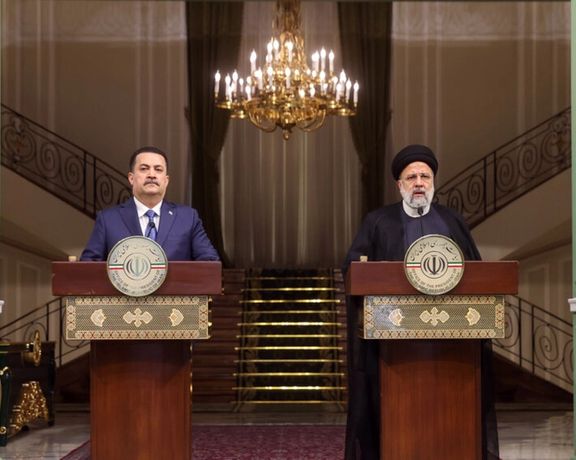
Iraqi Prime Minister Mohammed Shia al-Sudani arrived in Tehran early Monday, one day after US Secretary of State Antony Blinken visited Baghdad.
Al-Sudani was officially welcomed by president Ebrahim Raisi at Tehran's Saadabad palace, and held a joint press briefing after a meeting.
Iran’s official news agency IRNA quoted Raisi as saying that Tehran would welcome “any deterrent” measures by Islamic countries and regional states against Israel and the United States amid the conflict in Gaza.
The visit comes a day after al-Sudani met with Blinken, who visited Baghdad amid tight security following numerous drone and rocket attacks against US troops stationed in Iraq.
"It was very important to send a very clear message to anyone who might seek to take advantage of the conflict in Gaza to threaten our personnel here or anywhere else in the region: Don’t do it," Blinken told reporters after meeting al-Sudani.
Al-Sudani has pledged to pursue the perpetrators of rocket attacks on three military bases in Iraq hosting international coalition advisers, including Ain al-Asad in western Iraq, a military base near Baghdad's international airport and Harir in the northern Iraqi city of Erbil.
US forces shot down another one-way attack drone Sunday that was targeting American and coalition troops near their base in neighboring Syria, a US official said.
The US has warned it will respond to attacks by Iranian-backed groups. Iran has repeatedly called the US a "complicit" in what it describes as Israeli "war crimes" in Gaza, with Iranian foreign minister saying in late October that the US will not be "spared from this fire."